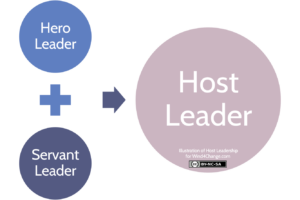Agile Leadership

Agile Leadership covers several topics.
What is the Host Leader and the Servant Leader?
Review the 4 positions of the Host Leader: in the spotlight, with the guests, in the gallery, in the kitchen. Learn about the : initiator, inviter, space creator, gatekeeper, connector and co-participator.
What is Emotional Intelligence by Daniel Goleman?
Emotional Intelligence is the capacity to acknowledge ones and others’ emotions, then leverage emotional information to adapt thinking and behavior to the environment and to achieve one’s goal. There are 5 competences: self-awareness, self-regulation, motivation, empathy, and social skills.
What are boundaries for leaders and teams? Why are they essential?
Boundaries are demarcation lines that differentiate a team from its environment and other teams. As a consequence, they enable this team to grow an identity, to concentrate on a focus and they protect this team from environmental interference and disruptions. To go further, boundaries also impact tasks and behaviors reinforcing those that are aligned with the team’s values and standards and inhibiting those that are not.
What is the Growth Mindset and the differences with the Fixed Mindset?
Carol Dweck growth mindset and fixed mindset. Fixed mindset: Failure is the limit of my abilities. Growth mindset: Failure is an opportunity to grow.
Psychological Safety by Amy C. Edmondson: definition and importance
What does Psychological Safety mean? Why is it important in an organization or a workplace? Really, why does Psychological Safety matter so much?
Psychological Safety by Amy C. Edmondson: create and improve
How can Psychological Safety be improved? And how to create Psychological Safety at work? See how the role of manager and relationship to failure change.
The 4 Stages of Psychological Safety by Timothy Clark
The 4 Stages of Psychological Safety by Timothy Clark: Psychological Safety progresses in 2 dimensions, Respect and Permission, and over 4 levels of Psychological Safety that are Inclusion Safety, Learner Safety, Contributor Safety and Challenger Safety.

